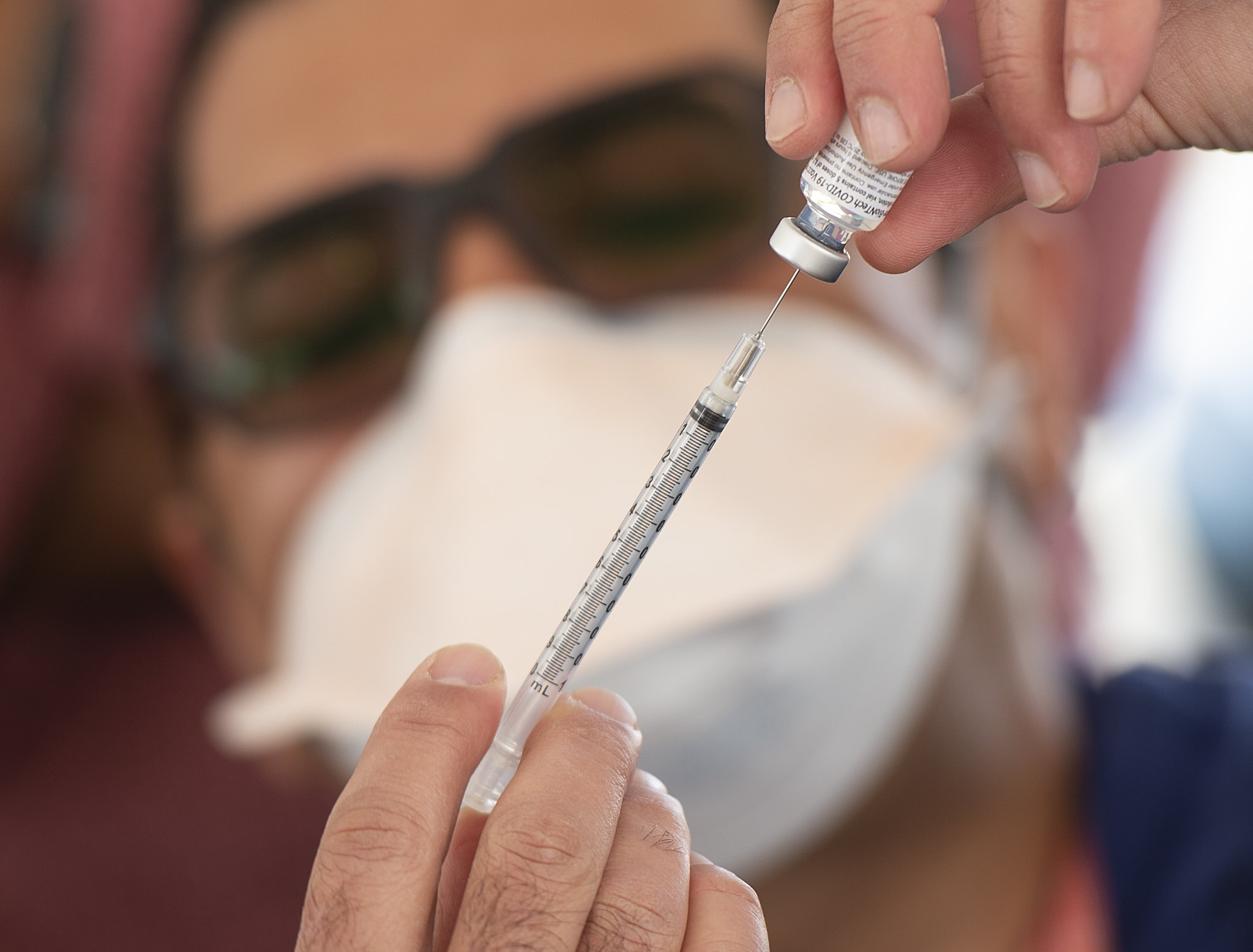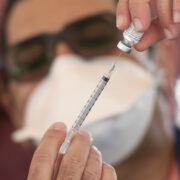
EVEN AS the Delta variant of COVID-19 pushes the surge in infection, hospitalization and death rates among unvaccinated people, the vaccination rate has stalled to just a little below 50%, still at 20-30% from the levels we need to be in to attain herd immunity and save lives.
The stark statistics come despite all the support from the Biden administration to grant all adults in America access to vaccines.
The surge is happening mostly in the southeast part of the country, where a lot of disinformation has been being peddled even by top local government officials. However, there are also many people who want to be vaccinated but are fearful of the possible side effects of the vaccine considering these are still being administered on an “emergency use authorization.”
Let us stick to the facts. These vaccines work. Since they had been given the emergency use authorization, they have been saving millions of lives, lowering infection, hospitalization and death rates. This is why we are now enjoying much more freedom when many of the public safety measures have been relaxed, precisely because people have been getting vaccinated with 70% of adults getting at least one dose and nearly a half have been fully vaccinated.
Until the Delta variant came into the picture and half of our people refuse to be vaccinated. It’s a dangerous and even deadly combination, especially for the unvaccinated, who comprise nearly all new cases of infection, mostly because of the Delta variant. There are few breakthrough cases among vaccinated people who tested positive are mostly asymptomatic or have no life-threatening symptoms because of the protection the vaccine gave them.
Even the kids and the younger ones are not spared by the Delta variant because they cannot yet be vaccinated, and are living with adults who can now be vaccinated but refuse to be vaccinated, or are catching the virus even from the vaccinated people who can carry the virus and transmit them to the unvaccinated. This is how fierce the Delta variant is. This is why it is crucial and lifesaving that the CDC now says we all should wear mask in enclosed settings and amid crowds.
Let us address the question of those with rational concerns about getting jabs from vaccines that are not yet fully approved by the FDA and are still on an “emergency use authorization.”
The New York Times reported: “Recent polls by the Kaiser Family Foundation, which has been tracking public attitudes during the pandemic, have found that three of every 10 unvaccinated people said that they would be more likely to get a shot with a fully approved vaccine. But the pollsters warned that many respondents did not understand the regulatory process and might have been looking for a “proxy” justification not to get a shot.”
The light at the end of the tunnel many have been waiting for: Pfizer may be getting the final approval around Memorial Day. Pfizer filed its application on May 7.
“Moderna, the second most widely used vaccine in the United States, filed for final approval of its vaccine on June 1. But the company is still submitting data and has not said when it will finish. Johnson & Johnson, the third vaccine authorized for emergency use, has not yet applied but plans to do so later this year,” the Times reported.
FDA spokesperson Michael Felberbaum said in a statement: “We have taken an all-hands-on-deck approach, including identifying additional resources such as personnel and technological resources from across the agency and opportunities to reprioritize other activities, in order to complete our review to help combat this pandemic surge.”
Pfizer getting final approval will ease the safety concerns of people about getting the vaccine and will help increase our vaccination rate. It will also be helpful for government institutions and private businesses to impose vaccination mandates to save lives and help us win this prolonged war against COVID-19 and its variants so we can move on building back our lives and our nation together.
Let us talk about the regulatory process that determines when vaccines can be given emergency use authorization, and when they can have final approval to understand and appreciate the process that affects all of us, especially as schools will reopen this September and many businesses have opened up again:
What is Emergency Use Authorization (EUA)?
According to the Food and Drug Administration (FDA), an Emergency Use Authorization (EUA) is a mechanism to facilitate the availability and use of medical countermeasures, including vaccines, during public health emergencies, such as the current COVID-19 pandemic.
Under an EUA, the FDA may allow the use of unapproved medical products, or unapproved uses of approved medical products in an emergency to diagnose, treat, or prevent serious or life-threatening diseases or conditions when certain statutory criteria have been met, including that there are no adequate, approved, and available alternatives. Taking into consideration input from the FDA, manufacturers decide whether and when to submit an EUA request to FDA.
Once submitted, FDA will evaluate an EUA request and determine whether the relevant statutory criteria are met, taking into account the totality of the scientific evidence about the vaccine that is available to the FDA.
What is the process that manufacturers are following to potentially make a COVID-19 vaccine available by EUA?
The FDA says “Vaccine manufacturers are undertaking a development process that includes tens of thousands of study participants to generate non-clinical, clinical, and manufacturing information needed by FDA for the agency to determine whether the known and potential benefits outweigh the known and potential risks of a vaccine for the prevention of COVID-19.
When the phase 3 portion of the human clinical trial reaches a predetermined point that informs how well a vaccine prevents COVID-19, as discussed and agreed to in advance with FDA, an independent group (called a data safety monitoring board) will review the data and inform the manufacturer of the results. Based on the data and the interpretation of the data by this group, manufacturers decide whether and when to submit an EUA request to FDA, taking into consideration input from FDA.
After FDA receives an EUA request, our career scientists and physicians will evaluate all of the information included in the manufacturer’s submission.
While FDA’s evaluation is ongoing, we will also schedule a public meeting of our Vaccines and Related Biological Products Advisory Committee, which is made up of external scientific and public health experts from throughout the country.
During the meeting, these experts, who are carefully screened for any potential conflicts of interest, will discuss the safety and effectiveness data so that the public and scientific community will have a clear understanding of the data and information that FDA is evaluating to make a decision whether to authorize a COVID-19 vaccine for emergency use.
Following the advisory committee meeting, FDA’s career professional staff will consider the input of the advisory committee members and continue their evaluation of the submission to determine whether the available safety and effectiveness and manufacturing data support an emergency use authorization of the specific COVID-19 vaccine in the United States.”
When is Final Approval Given?
A typical FDA team is comprised of: physicians, chemists, statisticians, pharmacologists/toxicologists, microbiologists, experts in postmarketing safety, clinical study site inspectors, manufacturing and facility inspectors, and labeling and communications experts.
FDA makes its decisions based on its analysis of the benefits and risks for the intended population who will receive the vaccine, as well as the disease(s) to be prevented. FDA’s scientific team works collaboratively to evaluate all of the scientific data and information included in Biologics License Application (BLA) to the FDA.
The agency includes preclinical and clinical data and information, as well as details of the manufacturing process and facility(ies), and makes the determination whether to approve a vaccine.
* * *
The opinions, beliefs and viewpoints expressed by the author do not necessarily reflect the opinions, beliefs and viewpoints of the Asian Journal, its management, editorial board and staff.
* * *
Gel Santos Relos has been in news, talk, public service and educational broadcasting since 1989 with ABS-CBN and is now serving the Filipino audience using different platforms, including digital broadcasting, and print, and is working on a new public service program for the community. You may contact her through email at gelrelos@icloud.com, or send her a message via Facebook at Facebook.com/Gel.Santos.Relos.






